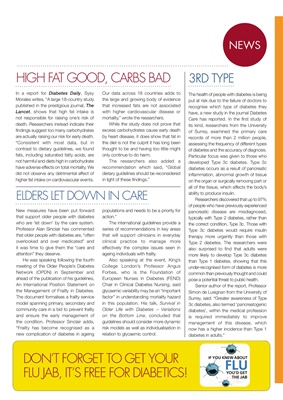
NEWS
3RD TYPE
The health of people with diabetes is being
put at risk due to the failure of doctors to
recognise which type of diabetes they
have, a new study in the journal Diabetes
Care has reported. In the first study of
its kind, researchers from the University
of Surrey, examined the primary care
records of more than 2 million people,
assessing the frequency of different types
of diabetes and the accuracy of diagnosis.
Particular focus was given to those who
developed Type 3c diabetes. Type 3c
diabetes occurs as a result of pancreatic
inflammation, abnormal growth of tissue
on the organ or surgically removing part or
all of the tissue, which affects the body's
ability to produce insulin.
Researchers discovered that up to 97%
of people who have previously experienced
pancreatic disease are misdiagnosed,
typically with Type 2 diabetes, rather than
the correct condition, Type 3c. Those with
Type 3c diabetes would require insulin
therapy more urgently than those with
Type 2 diabetes. The researchers were
also surprised to find that adults were
more likely to develop Type 3c diabetes
than Type 1 diabetes, showing that this
under-recognised form of diabetes is more
common than previously thought and could
pose a potential threat to public health.
Senior author of the report, Professor
Simon de Lusignan from the University of
Surrey, said: "Greater awareness of Type
3c diabetes, also termed 'pancreatogenic
diabetes', within the medical profession
is required immediately to improve
management of this disease, which
now has a higher incidence than Type 1
diabetes in adults."
In a report for Diabetes Daily, Sysy
Morales writes, "A large 18-country study
published in the prestigious journal, The
Lancet, shows that high fat intake is
not responsible for raising one's risk of
death. Researchers instead indicate their
findings suggest too many carbohydrates
are actually raising our risk for early death.
"Consistent with most data, but in
contrast to dietary guidelines, we found
fats, including saturated fatty acids, are
not harmful and diets high in carbohydrate
have adverse effects on total mortality. We
did not observe any detrimental effect of
higher fat intake on cardiovascular events.
HIGH FAT GOOD, CARBS BAD
New measures have been put forward
that support older people with diabetes
who are 'let down' by the care system.
Professor Alan Sinclair has commented
that older people with diabetes are, "often
overlooked and over medicated" and
it was time to give them the "care and
attention" they deserve.
He was speaking following the fourth
meeting of the Older People's Diabetes
Network (OPDN) in September and
ahead of the publication of his guidelines,
An International Position Statement on
the Management of Frailty in Diabetes.
The document formalises a frailty service
model spanning primary, secondary and
community care in a bid to prevent frailty
and ensure the early management of
the condition. Professor Sinclair adds,
"Frailty has become recognised as a
new complication of diabetes in ageing
ELDERS LET DOWN IN CARE
Our data across 18 countries adds to
the large and growing body of evidence
that increased fats are not associated
with higher cardiovascular disease or
mortality," wrote the researchers.
While the study does not prove that
excess carbohydrates cause early death
by heart disease, it does show that fat in
the diet is not the culprit it has long been
thought to be and having too little might
only continue to do harm.
The researchers also added a
recommendation which said, "Global
dietary guidelines should be reconsidered
in light of these findings."
populations and needs to be a priority for
action."
The international guidelines provide a
series of recommendations in key areas
that will support clinicians in everyday
clinical practice to manage more
effectively the complex issues seen in
ageing individuals with frailty.
Also speaking at the event, King's
College London's Professor Angus
Forbes, who is the Foundation of
European Nurses in Diabetes (FEND)
Chair in Clinical Diabetes Nursing, said
glycaemic variability may be an "important
factor" in understanding mortality hazard
in this population. His talk, Survival in
Older Life with Diabetes - Variations
on the Bottom Line, concluded that
guidelines should consider more dynamic
risk models as well as individualisation in
relation to glycaemic control.
DON'T FORGET TO GET YOUR
FLU JAB, IT'S FREE FOR DIABETICS!